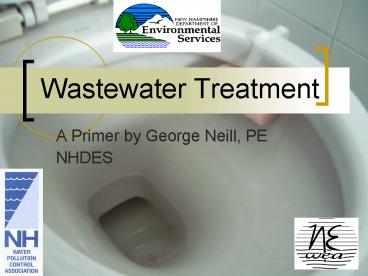Wastewater Treatment - PowerPoint PPT Presentation
1 / 22
Title:
Wastewater Treatment
Description:
Wastewater Treatment A Primer by George Neill, PE NHDES – PowerPoint PPT presentation
Number of Views:201
Avg rating:3.0/5.0
Title: Wastewater Treatment
1
Wastewater Treatment
- A Primer by George Neill, PE
- NHDES
2
Where does Wastewater come from?
Weather
Homes
Businesses
3
Where Does Wastewater Go?
Manchester, NH
4
New Hampshire
- Over 1.1 Billion in facility construction
- 85 municipal facilities
- 27 private domestic facilities
- 180 industrial facilities
- 755 certified operators
- Municipal flows (designed) 3000 GPD to 36 MGD
- Annual average daily flows 70 MGD
- 50 of population on sewer system
5
Why Clean Water?
- Health protect the public from illness/disease
- Drinking water supplies
- Recreational use
- Food fish and shellfish
- Two-thirds of the nations waters were unsafe for
fishing - The Potomac River was declared a National Disgrace
6
Why Clean Water
- Federal Government mandated
- Recognized the need to clean up our water bodies
- (River of Fire, Ohio)
7
Without Treatment Plants
8
Nashua River 1960s
9
Nashua River 1980s
10
Merrimack River 1960s
11
Merrimack River - Now
12
How did the Government Mandate Clean Water
- 1948 Water Pollution Control Act
- 1956 Federal Water Pollution Control Act
- 1965 Water Quality Act
- 1966 Clean Water Restoration Act
- 1970 Water Quality Improvements Act
- 1972 Clean Water Act
13
It Has Helped
- By the end of 2000
- Two-thirds of our surface waters were now safe
for fishing and swimming - The loss of wetlands was significantly reduced
- The amount of soil loss to agricultural runoff
was reduced by a billion tons per year - Modern wastewater treatment plants served over
175 million people
14
What needs to be done?
- Wastewater treatment interested in
- Making sure aquatic life has enough oxygen
- Reducing pollution from solid waste
- Killing pathogens to maintain human health
(drinking water down stream) - Limiting nutrients getting into the water to
prevent algal blooms (dead water)
15
What to worry about?
- Federal and State standards are becoming more and
more strict - This will REQUIRE NUMEROUS UPGRADES to existing
plants to be able to meet these standards - - Money is needed
- Public health if plants arent supported
16
U.S. State Reports on Population and the
Environment
- NH is the fastest growing state in New England
and the 10th fastest in the nation - 85 of the states growth is concentrated in the
southeastern part of the state only one-third
of the total land area - States population has doubled since 1950 and may
triple by 2020 - State ranks 4th in the nation in interstate
immigration - Each resident now occupies one-third more land
area than they did 20 yrs ago - Water use has increased more rapidly than the
states population
17
Future Needs
- Regardless of size, ALL facilities must face
upgrades, improvements, or equipment replacements
of one form or another over time - Please refer to the enclosed NEEDS survey for NH
future monetary requirements regarding wastewater
infrastructure - This list is not necessarily complete some
towns listed will need money in the near future,
although not noted on the survey
18
Facilities Exceeding 80 Design Capacity
Allenstown WWTF Manchester
Berlin WWTF Nashua
Canaan WWTF Newmarket
Conway VFD WWTF Northumberland WWTF
Gorham WWTF Peterborough WWTF
Groveton WWTF Plymouth
Hampton Sunapee WWTF
Hillsborough WWTF Whitefield WWTF
Hinsdale WWTF Winchester WWTF
Hooksett WWTF Wolfeboro WWTF
Lancaster
19
Other Concerns
- Plants will need to get more stuff out of the
water and that requires upgrades to technology
MONEY - Future funding is ALWAYS a concern
- Continued funding for SRF and state aid grant
program is critical for us to continue to meet
water quality goals
20
Where does it all go?
- Liquid goes back into the receiving water
- Solids must be handled in one or more of these
ways
21
Septage Disposal Practices 2005
22
Septage Disposal Trends
- Increased Use of Wastewater Treatment Plants
- Heavy Dependence on Out-of-State Facilities
- NHs Capacity Has Not Kept Pace with Growth!
- 78 of NHs Septage is Disposed at Wastewater
Treatment Plants































